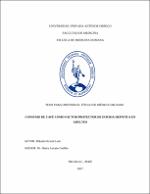Mostrar el registro sencillo del ítem
Consumo de café como factor protector de injuria hepática en adultos
| dc.contributor.advisor | Lozano Guillen, Henry | |
| dc.contributor.author | Kcomt Lam, Mikaela | |
| dc.creator | Kcomt Lam, Mikaela | |
| dc.date.accessioned | 2017-05-16T22:29:10Z | |
| dc.date.available | 2017-05-16T22:29:10Z | |
| dc.date.issued | 2017 | |
| dc.identifier | T_MED_2017 | |
| dc.identifier.uri | https://hdl.handle.net/20.500.12759/2637 | |
| dc.description.abstract | Determinar si el consumo de café es un factor protector de injuria hepática en adultos hospitalizados en los servicios de Medicina Interna 6C y Cirugía General 4B del Hospital Nacional Edgardo Rebagliati Martins. MATERIAL Y MÉTODO: Se llevó a cabo un estudio observacional, analítico, retrospectivo, casos y controles. Se evaluó a 160 pacientes, 60 fueron excluidos debido a que no cumplían con los criterios de selección, quedando un total de 100 pacientes. De este total, se dividieron en 2 grupos: 50 consumían café (grupo expuesto) y 50 no consumían café (grupo no expuesto), y se analizó el perfil hepático en ambos grupos. El periodo de estudio fue de Julio - Diciembre 2016. RESULTADOS: Se analizó si el consumo de café es un factor protector de injuria hepática en pacientes hospitalizados en el Hospital Nacional Edgardo Rebagliati Martins entre Julio a Diciembre 2016. Del grupo que consume café, el 76% son de sexo femenino y el 24% de sexo masculino; presentan una edad promedio de 62.5 años, tienen un tiempo de consumo promedio de 11.6 años y consumen un promedio de 10.9 tazas por semana. Del total de pacientes que consumen café, el 76% presentaron niveles séricos bajos de marcadores de injuria hepática, a comparación del grupo que no consume café, presentando sólo el 40% niveles bajos de marcadores de injuria hepática, encontrándose una relación altamente significativa (p= 0.001 < 0.01). El tipo de café consumido con mayor frecuencia fue el café con cafeína en un 74%. En pacientes que consumen café con cafeína el 75.7 % tuvieron niveles séricos disminuidos de transaminasas a diferencia de 76.9 % en aquellos que consumen café descafeinado, siendo esta una relación no significativa (p= 0.920 > 0.05). Es decir, el contenido de cafeína en el café no determinó la disminución de los niveles séricos de transaminasas. CONCLUSIONES: El consumo de café es un factor protector de injuria hepática con alta significancia estadística, independientemente del contenido de cafeína. | es_PE |
| dc.description.abstract | To determine whether coffee consumption is a protective factor of liver injury in adults hospitalized in the Internal Medicine 6C and General Surgery 4B departments of the Hospital Nacional Edgardo Rebagliati Martins. MATERIAL AND METHOD: An observational, analytical, retrospective, case-control study was conducted. A total of 160 patients were evaluated, 60 were excluded because they did not meet the selection criteria, leaving a total of 100 patients. The remaining patients were divided into 2 groups: 50 consumed coffee and 50 did not consume coffee; and their liver enzymes were analyzed. The study period was from July to December 2016. RESULTS: It was analyzed whether coffee consumption is a protective factor of liver injury in adults hospitalized in the Hospital Nacional Edgardo Rebagliati Martins from July to December 2016. Of the group that consumes coffee, 76% are female and 24% are male; the average age was 62.5 years, the average consumption time was 11.6 years and the average cups consumed per week was 10.9. Of the total number of patients consuming coffee, 76% had low serum levels of markers of liver injury, compared to the non-consuming coffee group, with only 40% having low levels of markers of liver injury, being this a highly significant relation (p = 0.001 <0.01). The type of coffee most frequently consumed was caffeinated coffee in 74% of the cases. In patients consuming caffeinated coffee, 75.7% had decreased serum levels of transaminases, as compared to 76.9% in those who consumed decaffeinated coffee, being this a non-significant relation (p = 0.920> 0.05). This means that the caffeine content in coffee did not determine the decrease in serum levels of transaminases. CONCLUSIONS: Coffee consumption is a protective factor of liver injury in adults with high statistical significance, regardless of caffeine content. | en_US |
| dc.format | application/pdf | es_PE |
| dc.language.iso | spa | es_PE |
| dc.publisher | Universidad Privada Antenor Orrego - UPAO | es_PE |
| dc.relation.ispartofseries | T_MED_2017 | |
| dc.rights | info:eu-repo/semantics/openAccess | es_PE |
| dc.source | Universidad Privada Antenor Orrego | es_PE |
| dc.source | Repositorio institucional - UPAO | es_PE |
| dc.subject | Consumo de Café | es_PE |
| dc.subject | Enzimas Hepaticas | es_PE |
| dc.title | Consumo de café como factor protector de injuria hepática en adultos | es_PE |
| dc.type | info:eu-repo/semantics/bachelorThesis | es_PE |
| thesis.degree.level | Título Profesional | es_PE |
| thesis.degree.grantor | Universidad Privada Antenor Orrego. Facultad de Medicina Humana | es_PE |
| thesis.degree.name | Médico Cirujano | es_PE |
| thesis.degree.discipline | Medicina | es_PE |
Ficheros en el ítem
Este ítem aparece en la(s) siguiente(s) colección(es)
-
Medicina Humana [2739]

